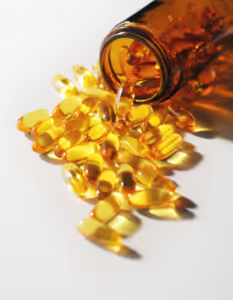How Can I Reduce Endo Belly Bloating?


have already shared their stories
How Can I Reduce Endo Belly Bloating?
Today's question is "How can I reduce endo belly bloating?" Before answering, it's important to consider why bloating occurs in the first place. There is always an underlying cause, and identifying this cause is key to long-term relief from endo belly. It could be SIBO, intestinal dysbiosis (an imbalance of bacteria in the gut), inflammation, food intolerance, or even adhesions affecting the flow of digestion. All of these are possible with endometriosis, and it's likely that there's not just one cause, but perhaps two or more.
But today, we are focusing on reducing short-term symptoms, so we are looking for what might help when the bloating hits. What works for you will really depend on your body and your underlying causes, but today I'll share some of the most successful approaches that cover a range of possible triggers. Before starting, consult your doctor if you decide to try any of these supplements.

Bodywork and Movement
The first point is bodywork or movement. If your endo belly is caused by a buildup of gas or disrupted digestive flow, perhaps due to adhesions, tight fascia, or even pelvic floor issues, we want to try to help release that gas or digestive flow and get things moving again.
Often people don't realize they have a gas buildup. If you're bloated and your stomach expands noticeably, especially after meals or throughout the day, there's a good chance that at least part of it is caused by gas buildup. If it gets trapped and isn't released, you might not always realize it's gas, because firstly, you're not passing it, so you don't notice a lot of flatulence, and secondly, you don't always feel the movement or pain caused by gas, even when it's building up.
Returning to movement and bodywork, "I Love You" self-massage is a quick self-massage that takes about 5 to 10 minutes and is specifically designed to help digestion, relieve gas, bloating, constipation, etc. The best thing about this massage is that you can find free tutorials on YouTube, and I've included a link to the video.
Since exercise is very helpful for facilitating the passage of gas and food through the digestive tract, there are many stretches and yoga movements for bloating on YouTube, and I've included one in the show notes. Additionally, taking a 10-minute walk when bloating starts or jumping on a rebounder or trampoline can really help get things moving. If you've just eaten, I recommend sticking with the walk or light stretches so you don't disrupt digestion, but if it's been more than an hour since you ate, you can get on that rebounder and jump.
Supplements

Vitamin D
In the case of endometriosis, vitamin D has important antiproliferative, anti-inflammatory, and immunomodulatory actions; meaning it helps inhibit the uncontrolled formation of endometrial tissue and strengthens the immune system. Supplementing with vitamin D can reduce menstrual pain associated with endometriosis and, in the case of trying to conceive, helps improve ovarian quality.
The daily requirement of vitamin D is 400 IU. If blood tests show a deficiency, the supplementation dosage can range from 400 to 2000 IU daily. Beyond this limit, vitamin D supplementation requires strict medical supervision.
Omega-3
A balanced intake of omega-3 and omega-6 is important to support the production of anti-inflammatory cytokines. In cases of low-grade inflammation, supplementing with omega-3 can be useful in enhancing the response to oxidative stress.
The most important thing is that the supplementation is of high quality (this is true not only for endometriosis!). It should have:
- IFOS certification to ensure the absence of heavy metals
- Dark capsules to prevent rancidity from sun exposure
- An added stabilizer and antioxidant (such as vitamin E)
There are many good supplements on the market that differ in the amount of EPA and DHA and the suggested dosage. Supplementation should be personalized to avoid underdosing (which essentially means a waste of money) or overdosing (excess omega-3 has serious side effects).
Vitamin C and Bioflavonoids
These two molecules support the radical cascade due to their antioxidant action. Supplementing with vitamin C as an antioxidant is indicated for women with endometriosis who also have circulation problems, fragile capillaries, or are particularly prone to seasonal illnesses.
Bioflavonoids contribute to strengthening the capillary walls, improving blood circulation, and consequently the delivery of nutrients to various tissues and organ districts.
Vitamin C has a saturable absorption mechanism: taking large doses of vitamin C is useless (and counterproductive) because our body can only absorb a certain amount at a time; the excess is eliminated through urine or, in worse cases, dangerously accumulates in our body, leading to kidney problems.

have already shared their stories
Sources
- Healthline: "Endo Belly: What It Is, Symptoms, Causes, Treatment" - This article provides an overview of endo belly, including symptoms, potential causes related to endometriosis, and treatment options. It discusses dietary changes and self-care measures for managing symptoms. Healthline .
- Dr. Seckin: "Endo Belly: Symptoms, Causes, and Treatment Options" - This resource outlines the causes and symptoms of endo belly, differentiating it from other gastrointestinal issues and discussing treatment strategies. Dr. Seckin .
- Medical News Today: "Endo belly: Causes, symptoms, and treatment options" - This article explains the term "endo belly," its association with endometriosis, and offers insights into the digestive issues that accompany it. It also highlights the importance of a proper diagnosis. Medical News Today .
- CCRM Fertility: "What Is Endo Belly? Experts Explain" - This expert-driven article discusses the definition of endo belly, its symptoms, and potential causes. It includes insights from medical professionals on how to distinguish it from other types of bloating. CCRM Fertility .
- EndoFound: "Endo Belly, Severe Bloating, Endometriosis" - This resource describes severe bloating associated with endometriosis and provides tips for managing symptoms through dietary changes and lifestyle adjustments. EndoFound .
- Dr. Brighten: "Endo Belly: Causes and Treatments for Endometriosis Bloating" - This article discusses the causes of endo belly and suggests various management strategies including dietary changes and supplements. Dr. Brighten .
- Spire Healthcare: "What is endo belly and how can you manage it?" - This article explains the condition of endo belly in relation to endometriosis and outlines possible management strategies including dietary modifications and medical interventions. Spire Healthcare .

.avif)





